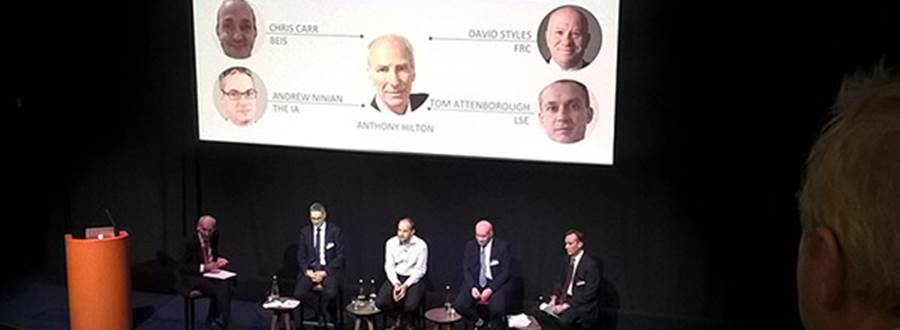Once again held at the Ham Yard Hotel in London’s Soho, more than 100 clients and contacts came to hear our speakers discuss the issues facing our industry.
“It’s been a year of quite significant change,” said Stuart Ellen, Equiniti’s Managing Director, in his welcome address. He continued:
We've had the Financial Reporting Council’s (FRC) papers on board succession and board culture, Market Abuse Regulation (MAR), Markets in Financial Instruments Directive (MIFID II), taxation changes on the treatment of dividends and, of course, Brexit.
At the same time, Equiniti has continued to innovate and develop its proposition. For example earlier this year Equiniti helped Jimmy Choo, the luxury accessories brand, particularly famous for its women's shoes, to become the first ever UK PLC to offer an electronic AGM.
It has also been an award-winning year for the business. “Over the last 12 months we have achieved a clean sweep of three industry awards, for service, for Best Registrar, and for best provider of shareholder services”.
And there has been a notable change for the business since the last Share Registration Conference, Paul Matthews, Equiniti’s Executive Director for Corporate Markets, commented, as just a few days after the 2015 Share Registration conference, Equiniti launched its own IPO. Paul said:
It has been a learning curve, but an overwhelmingly positive experience too. We are managing exactly the same challenges as a business that you, our clients, are. But equally the world hasn’t changed just because we are listed. Equiniti will continue to expand its proposition, both organically and by acquisition, and continue to serve customers in exactly the same way.
The themes discussed at the conference were wide-ranging and included blockchain, workers on boards, the future of corporate governance and Brexit, whilst Chris Carr, Deputy Director at the newly-formed Department for Business, Energy & Industrial Strategy (BEIS), addressed the topic of Looking to the Future – UK Company Law and Corporate Governance. Chris is one of the officials tasked with providing ministers with a Brexit plan. Speaking on the subject in public for the first time, he reminded attendees that Brexit is a reality, not a proposition.
The Prime Minister has repeatedly said that Brexit means Brexit and will mean a definite exit from the EU. The only question is precisely how and when. The message from the government is that it is committed to making sure that the UK gets the best possible deal in the Brexit negotiations, and that as well as being a great place to do business the UK must also make sure it is where business is done best. For this, good corporate governance is key.
In the panel session that followed, David Styles, Director of Corporate Governance at the FRC, echoed the same sentiment. While it is acknowledged that the UK has a strong corporate governance regime, the vote to leave the EU raises some reasons for concern. The audience heard that businesses must make sure that corporate governance does not become just something about boards and shareholders, but rather it should be about the culture of companies and how they interact with wider society. If that is achieved, a post-Brexit UK should remain a place that people want to invest in.
Andrew Ninian, Director of Corporate Governance and Engagement at The Investment Association (IA) pointed out, that while a post-Brexit UK could be a place that attracts high levels of foreign investment, negotiations will be long and challenging. And while there is of course still some uncertainty about what Brexit actually means, getting the right trading relationships with Europe is vital to understand what environment we are going to be operating in.
For fellow panel member Tom Attenborough, Head of UK Large Caps at the London Stock Exchange, (LSE), there are many areas of business that Brexit doesn’t touch. The example cited was that there is no need for companies to list in the country or continent of their customers. Indeed, the first company to list in the UK after the Brexit vote was an Italian PR firm.
The panel was chaired by London Evening Standard Financial Editor, Anthony Hilton.
Chris Stamp, Director of Prism Cosec, an Equiniti Group company secretarial and corporate governance practice, then addressed guests on research he had carried out into the implementation of the new Market Abuse Regulation that came into force in July. Chris said:
One of the key observations I would make is that a lot of companies have actually applied MAR in very different ways.
In a poll of attendees, most agreed that the new regime had increased the workload of CoSec departments. Attendees also said that they had managed to keep their insider lists as tight as possible.
In the closing address, the Standard’s Anthony Hilton commented that, post Brexit, we are now living in a “post factual world”. Government has identified trust in business as an issue “and so they are now interested as never before in corporate governance”. He continued:
Corporate governance used to be about running the company well. Then it became about dealing with regulators. Now we have political corporate governance, and that means giving the people what they want.
Ideas such as split boards, shareholders’ committees, executive remuneration and workers on board are increasingly being debated, he said, and “the landscape is changing rapidly.” On that note, he closed the conference for another year.

